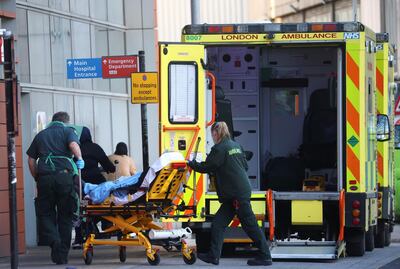Coronavirus is learning to adapt to the human body more quickly and might never be wiped out, a leading scientist warned.
Prof John Bell of Oxford University said Covid-19 was becoming “more efficient at living in humans”, as he highlighted the complexity of new strains of the virus found in South Africa and Brazil.
"Big problems come with the South African and Brazil (variants) because changes in the virus are quite profound," he said.
"I think it could be quite hard to neutralise but it may well be that the vaccines are good enough to give us the protection we want them to.”
The warning comes as Britain's Health Secretary Matt Hancock said that vaccines may be less effective against new variants of the disease.
Mr Hancock said that stricter border controls were justified as he confirmed there were 77 known cases of the South African variant in the UK.
Prof Bell, a scientific adviser to the government, said that urgent research was needed on whether Covid vaccines needed to be adapted.
"We need critical data,” he said. “We are hovering at the moment because if we are going to make a new vaccine we need to get our skates on. It's something we need to be thinking of now.”
More than 6.3 million people in the UK have been given their first dose of the Covid-19 vaccine, including three quarters of those aged over 80.
Mr Hancock said the government was conducting a vaccine trial on the South African variant to analyse its response to the inoculation, amid concerns that new variants are developing elsewhere.
“The new variant I really worry about is the one that’s out there but hasn’t been spotted,” he said.
The UK is offering its genome-sequencing capability to other countries to help them identify new strains, Mr Hancock said.
Britain has already banned flights from South Africa and its neighbouring countries, plus all of South America, in a bid to stop the spread of the new variants.
Mr Hancock said the government didn’t rule out introducing even stricter international travel measures in the days ahead.
Schools 'shut until Easter'
Meanwhile, the health chief suggested pupils in England face months at home with schools to remain shut until Easter.
He said any easing of lockdown restrictions was a “long, long, long way off”.
“You can see the pressure on the NHS – you can see it every day,” he told Sky News.
He refused to commit to either mid-February or after Easter as a point for schools to reopen to all pupils.
“We’re really clear we want to get schools back and as safe as we can but we have to watch the data,” he said.
Robert Halfon, Conservative MP for Harlow, urged the government to lay out a plan in the Commons to “get children learning again at school”.
Mark Harper, Tory member of parliament for Forest of Dean, said lockdown should be lifted when the government hits “key milestones” of its inoculation campaign.
“Once you’ve vaccinated those first four priority groups … you’ve reduced the risk of dying from Covid by nearly 90 per cent, the risk of hospitalisation by 55 per cent,” he told the BBC.
“At that point you need to start bringing the economy back to life. The first thing that should reopen is our schools.
"What we’re asking for now is for the government to set out that plan and bring some clarity.”
But Work and Pensions Secretary Therese Coffey said the government was concerned about students being potential vectors of the virus.
“We know schools are safe for children but it's about the wider impact,” she told Sky News.
Plan for lockdown 'halfway house'
UK ministers are meanwhile considering a three-month period of relaxed restrictions after Easter, but a full reopening of the economy was not likely to occur until June.
The proposal was likened to a lockdown "halfway house", The Telegraph reported.
Officials are understood to be planning reopening schools first, followed by allowing people to meet friends and family outdoors.
Hospitality venues would then reopen with social distancing measures.
A return to “normal” is unlikely until the majority of over-50s had been given their second dose of the vaccine in June.
Andy Wood, chief executive of pub chain Adnams, said businesses are planning for a gradual reopening of the economy after lockdown.
"We think it's highly likely we'll be opening into a tiered structure," he told BBC Radio 4's Today programme.


